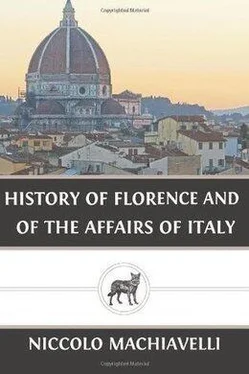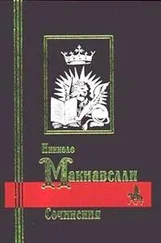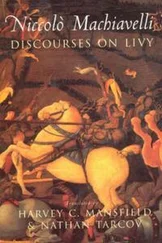Николо Макиавелли - History of Florence and of the Affairs of Italy
Здесь есть возможность читать онлайн «Николо Макиавелли - History of Florence and of the Affairs of Italy» весь текст электронной книги совершенно бесплатно (целиком полную версию без сокращений). В некоторых случаях можно слушать аудио, скачать через торрент в формате fb2 и присутствует краткое содержание. Год выпуска: 2014, Издательство: epubBooks Classics, Жанр: История, на английском языке. Описание произведения, (предисловие) а так же отзывы посетителей доступны на портале библиотеки ЛибКат.
- Название:History of Florence and of the Affairs of Italy
- Автор:
- Издательство:epubBooks Classics
- Жанр:
- Год:2014
- ISBN:нет данных
- Рейтинг книги:3 / 5. Голосов: 1
-
Избранное:Добавить в избранное
- Отзывы:
-
Ваша оценка:
- 60
- 1
- 2
- 3
- 4
- 5
History of Florence and of the Affairs of Italy: краткое содержание, описание и аннотация
Предлагаем к чтению аннотацию, описание, краткое содержание или предисловие (зависит от того, что написал сам автор книги «History of Florence and of the Affairs of Italy»). Если вы не нашли необходимую информацию о книге — напишите в комментариях, мы постараемся отыскать её.
History of Florence and of the Affairs of Italy — читать онлайн бесплатно полную книгу (весь текст) целиком
Ниже представлен текст книги, разбитый по страницам. Система сохранения места последней прочитанной страницы, позволяет с удобством читать онлайн бесплатно книгу «History of Florence and of the Affairs of Italy», без необходимости каждый раз заново искать на чём Вы остановились. Поставьте закладку, и сможете в любой момент перейти на страницу, на которой закончили чтение.
Интервал:
Закладка:
The weakness of the conspirators was obvious; and many Florentines residing in the town, assembled together, among whom, Giorgio Ginori, a knight of Rhodes, took arms first against them, and attacked Bernardo, who traversed the piazza, alternately entreating and threatening those who refused to obey him, and being surrounded by Giorgio's followers, he was wounded and made prisoner. This being done, it was easy to set the governor at liberty and subdue the rest, who being few, and divided into several parties, were nearly all either secured or slain. An exaggerated report of these transactions reached Florence, it being told there that Prato was taken, the governor and his friends put to death, and the place filled with the enemy; and that Pistoia was also in arms, and most of the citizens in the conspiracy. In consequence of this alarming account, the palace as quickly filled with citizens, who consulted with the Signory what course ought to be adopted. At this time, Roberto da San Severino, one of the most distinguished generals of this period, was at Florence, and it was therefore determined to send him, with what forces could be collected, to Prato, with orders that he should approach the place, particularly observe what was going on, and provide such remedies as the necessity of the case and his own prudence should suggest. Roberto had scarcely passed the fortress of Campi, when he was met by a messenger from the governor, who informed him that Bernardo was taken, his followers either dispersed or slain, and everything restored to order. He consequently returned to Florence, whither Bernardo was shortly after conveyed, and when questioned by the magistracy concerning the real motives of such a weak conspiracy, he said, he had undertaken it, because, having resolved to die in Florence rather than live in exile, he wished his death to be accompanied by some memorable action.
This disturbance having been raised and quelled almost at the same time, the citizens returned to their accustomed mode of life, hoping to enjoy, without anxiety, the state they had now established and confirmed. Hence arose many of those evils which usually result from peace; for the youth having become more dissolute than before, more extravagant in dress, feasting, and other licentiousness, and being without employment, wasted their time and means on gaming and women; their principal study being how to appear splendid in apparel, and attain a crafty shrewdness in discourse; he who could make the most poignant remark being considered the wisest, and being most respected. These manners derived additional encouragement from the followers of the duke of Milan, who, with his duchess and the whole ducal court, as it was said, to fulfill a vow, came to Florence, where he was received with all the pomp and respect due to so great a prince, and one so intimately connected with the Florentine people. Upon this occasion the city witnessed an unprecedented exhibition; for, during Lent, when the church commands us to abstain from animal food, the Milanese, without respect for either God or his church, ate of it daily. Many spectacles were exhibited in honor of the duke, and among others, in the temple of Santo Spirito, was represented the descent of the Holy Ghost among the apostles; and in consequence of the numerous fires used upon the occasion, some of the woodwork became ignited, and the church was completely destroyed by the flames. Many thought that the Almighty being offended at our misconduct, took this method of signifying his displeasure. If, therefore, the duke found the city full of courtly delicacies, and customs unsuitable to well–regulated conduct, he left it in a much worse state. Hence the good citizens thought it necessary to restrain these improprieties, and made a law to put a stop to extravagance in dress, feasts, and funerals.
In the midst of this universal peace, a new and unexpected disturbance arose in Tuscany. Certain citizens of Volterra had discovered an alum–mine in their district, and being aware of the profit derivable from it, in order to obtain the means of working and securing it, they applied to some Florentines, and allowed them to share in the profits. This, as is frequently the case with new undertakings, at first excited little attention from the people of Volterra; but in time, finding the profits derived from it had become considerable, they fruitlessly endeavored to effect what at first might have been easily accomplished. They began by agitating the question in their councils, declaring it grossly improper that a source of wealth discovered in the public lands should be converted to the emolument of private individuals. They next sent advocates to Florence, and the question was referred to the consideration of certain citizens, who, either through being bribed by the party in possession, or from a sincere conviction, declared the aim of the people of Volterra to be unjust in desiring to deprive their citizens of the fruit of their labor; and decided that the alum–pit was the rightful property of those who had hitherto wrought it; but, at the same time, recommended them to pay an annual sum by way of acknowledgment to the city. This answer instead of abating, served only to increase the animosities and tumult in Volterra, and absorbed entire attention both in the councils and throughout the city; the people demanding the restitution of what they considered their due, and the proprietors insisting upon their right to retain what they had originally acquired, and what had been subsequently been confirmed to them by the decision of the Florentines. In the midst of these disturbances, a respectable citizen, named Il Pecorino, was killed, together with several others, who had embraced the same side, whose houses were also plundered and burned; and the fury of the mob rose to such a height, that they were with difficulty restrained from putting the Florentine rectors to death.
After the first outrage, the Volterrani immediately determined to send ambassadors to Florence, who intimated, that if the Signory would allow them their ancient privileges, the city would remain subject to them as formerly. Many and various were the opinions concerning the reply to be made. Tommaso Soderini advised that they should accept the submission of the people of Volterra, upon any conditions with which they were disposed to make it; for he considered it unreasonable and unwise to kindle a flame so near home that it might burn their own dwelling; he suspected the pope's ambition, and was apprehensive of the power of the king; nor could he confide in the friendship either of the duke or the Venetians, having no assurance of the sincerity of the latter, or the valor of the former. He concluded by quoting that trite proverb, "Meglio un magro accordo che una grassa vittoria." [2] A lean peace is better than a fat victory.
On the other hand, Lorenzo de' Medici, thinking this an opportunity for exhibiting his prudence and wisdom, and being strenuously supported by those who envied the influence of Tommaso Soderini, resolved to march against them, and punish the arrogance of the people of Volterra with arms; declaring that if they were not made a striking example, others would, without the least fear or respect, upon every slight occasion, adopt a similar course. The enterprise being resolved on, the Volterrani were told that they could not demand the observance of conditions which they themselves had broken, and therefore must either submit to the direction of the Signory or expect war. With this answer they returned to their city, and prepared for its defense; fortifying the place, and sending to all the princes of Italy to request assistance, none of whom listened to them, except the Siennese and the lord of Piombino, who gave them some hope of aid. The Florentines on the other hand, thinking success dependent principally upon celerity, assembled ten thousand foot and two thousand horse, who, under the command of Federigo, lord of Urbino, marched into the country of Volterra and quickly took entire possession of it. They then encamped before the city, which, being in a lofty situation, and precipitous on all sides, could only be approached by a narrow pass near the church of St. Alessandro. The Volterrani had engaged for their defense about one thousand mercenaries, who, perceiving the great superiority of the Florentines, found the place untenable, and were tardy in their defensive operations, but indefatigable in the constant injuries they committed upon the people of the place. Thus these poor citizens were harassed by the enemy without, and by their own soldiery within; so, despairing of their safety, they began to think of a capitulation; and, being unable to obtain better terms, submitted to the discretion of the Florentine commissaries, who ordered the gates to be opened, and introduced the greater part of their forces. They then proceeded to the palace, and commanded the priors to retire to their homes; and, on the way thither, one of them was in derision stripped by the soldiers. From this beginning (so much more easily are men predisposed to evil than to good) originated the pillage and destruction of the city; which for a whole day suffered the greatest horrors, neither women nor sacred places being spared; and the soldiery, those engaged for its defense as well as its assailants, plundered all that came within their reach. The news of this victory was received with great joy at Florence, and as the expedition had been undertaken wholly by the advice of Lorenzo, he acquired great reputation. Upon which one of the intimate friends of Tommaso Soderini, reminding him of the advice he had given, asked him what he thought of the taking of Volterra; to which he replied, "To me the place seems rather lost than won; for had it been received on equitable terms, advantage and security would have been the result; but having to retain it by force it will in critical junctures, occasion weakness and anxiety, and in times of peace, injury and expense."
Интервал:
Закладка:
Похожие книги на «History of Florence and of the Affairs of Italy»
Представляем Вашему вниманию похожие книги на «History of Florence and of the Affairs of Italy» списком для выбора. Мы отобрали схожую по названию и смыслу литературу в надежде предоставить читателям больше вариантов отыскать новые, интересные, ещё непрочитанные произведения.
Обсуждение, отзывы о книге «History of Florence and of the Affairs of Italy» и просто собственные мнения читателей. Оставьте ваши комментарии, напишите, что Вы думаете о произведении, его смысле или главных героях. Укажите что конкретно понравилось, а что нет, и почему Вы так считаете.












